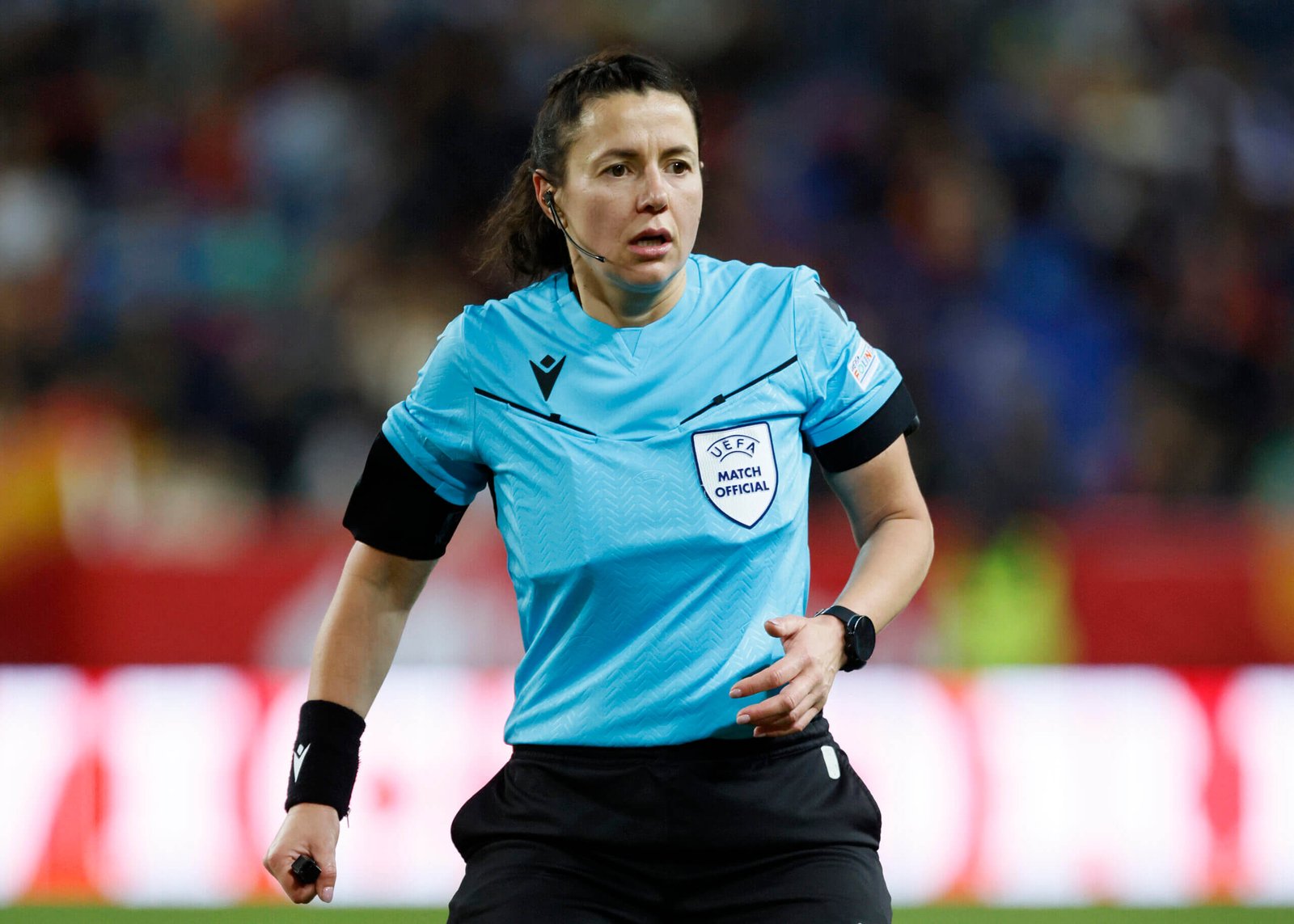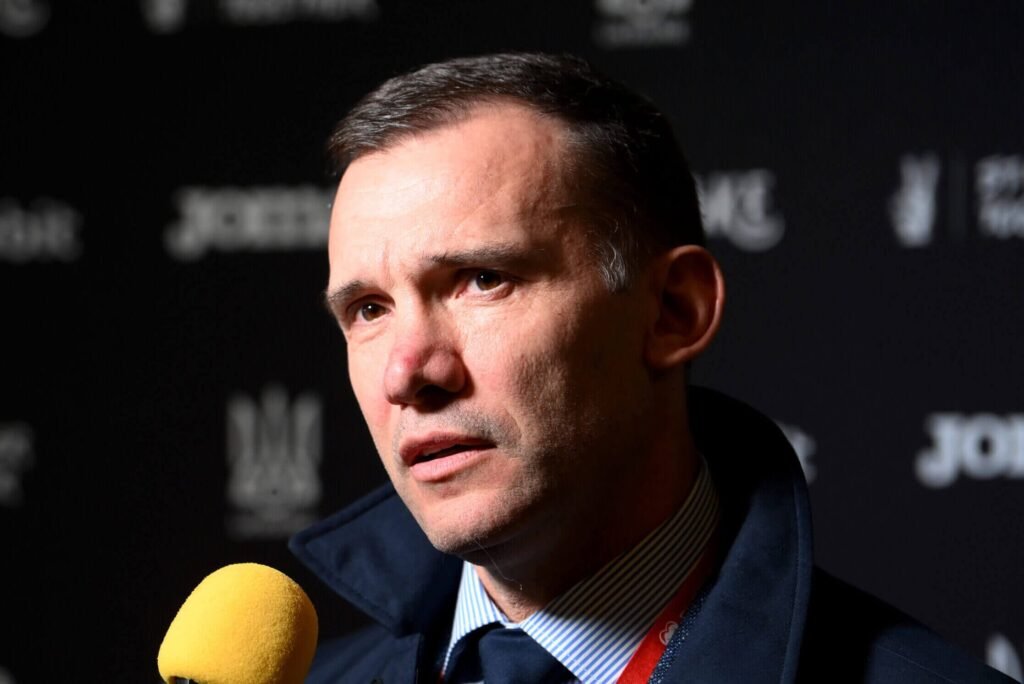A solitary bead of sweat meanders down Premier League referee Tony Harrington’s forehead.
He cautiously breathes in, holds, then quietly exhales in silence, nervously awaiting the question.
“Tony… last weekend you disallowed Wolves defender Maximilian Kilman’s header in the last minute… bit of a weird decision… are you secretly a West Ham fan?”.
Harrington pauses, then attempts to answer as confidently as possible: “No.”
The needle on the polygraph flickers from side to side. Harrington wipes his brow. This is not what he became a referee for.
Fiction? Yes, the above is an entirely made-up story. Well, circumstances have been altered for dramatic purposes. But the tale of a football referee facing a lie detector test in 2024? That is entirely true in one European country.
Nobody can accuse the Ukrainian FA of not taking an unusual and radical approach to improving officiating standards.
The association, headed up by its recently-appointed president — legendary striker and former Ukraine national-team manager Andriy Shevchenko — has introduced a drastic new measure recently. Its referees are now subject to polygraph tests.
To the uninitiated, polygraphs measure a person’s changes in blood pressure, blood flow, respiratory rate and sweat responses to try to determine whether they are telling the truth.
Why are they being used in Ukrainian football? According to the FA there, the aim is to avoid accusations of bias and improve standards but also, more importantly, to help eradicate corruption, bribery and match-fixing. These issues have blighted the sport in Ukraine for many years — going back to the Soviet era.
That is not all they are doing — the Ukraine FA has also changed the way referees are assigned to matches. Previously, like across Europe’s most prominent domestic competitions including the Premier League, Bundesliga and La Liga, refs were appointed to specific matches by panels on a week-by-week basis. The best of them get the biggest matches, et cetera.
Shevchenko with an assistant referee while coaching Ukraine in 2020 (Peter Dejong/POOL/AFP via Getty Images)
Now, Ukrainian top-flight fixtures have their referees assigned completely at random. They are drawn out of a metaphorical hat. “A lottery system,” the FA says.
The system is still being trialled, with former Arsenal defender Oleg Luzhnyi (now the head of the FA’s professional football committee) helping to conduct a recent draw.
The most famous example of random referee selection in European football probably comes from 1984-85 when Serie A, for one season only, randomly assigned refs to games for the first time. That was also part of an attempt to clean up the image of the country’s top football league.
The champions of Italy that season? An incredibly unlikely triumph for Verona, who won their only Scudetto. For 1985-86 it was back to the old system (Juventus were champions that year).
But while random selection may be an unusual step, it is the polygraphs which catch the eye.
“We see the polygraph as an opportunity to get more information to understand which referees we can work with and which ones we can’t,” Shevchenko said. “We are starting from a clean slate.”
Shevchenko also stated that anyone who fails to pass the polygraph will no longer be allowed to referee.
With Ukraine’s history of corruption, his role is important in terms of public confidence, given Shevchenko’s unrivalled status in football and society there. Another pivotal figure is Kateryna Monzul, a former ref who is the new head of the Ukrainian FA’s referee committee. This committee oversees the polygraph procedures and the random draw selections.
Monzul was voted the best female referee in the world in 2015 and had an incredibly distinguished refereeing career. She officiated at three women’s World Cups, in the Ukrainian men’s Premier League (the first female to do so) and also at World Cup qualifiers, Europa League and Nations League matches in the men’s game.
Again, confidence in the respected Monzul is importantly high. She replaced an Italian, Luciano Lucci, who had held the position since 2015.
The polygraph idea was first proposed last year and, unsurprisingly, there was some opposition to it. Volodymyr Sharan, the former manager of top-flight side FC Minaj, said: “Well, that’s too much, I’m sorry. This is control.
“The human factor will always be present, there will (always) be some kind of mistake, you can’t get away from this, but there is VAR insurance. Let’s check the football players and team coaches (instead). We will arrive three hours before the game and pass all the lie detector tests.”

Monzul now has a senior role in this setup (Richard Sellers/Sportsphoto/Allstar via Getty Images)
The frequency of these polygraph tests and the questions that are asked during them are shrouded in secrecy. The Ukrainian FA told The Athletic that if specific details about the process were released, it could negatively affect the process.
Reports in Ukraine suggest several referees have already taken tests and all passed. Assistant referees and referee observers are also being tested, it has been claimed.
Ukrainian former FIFA referee Myroslav Stupar believes it is a positive move. “It can make refereeing fairer,” he says. “Sometimes arguments can break out between referees and representatives of certain clubs, so it is worth noting that in some games these referees do not judge the matches of the teams with which the conflict arose. I believe that Kateryna Monzul will fix it.”
If it all feels a bit extreme, then context is needed.
Firstly, match-fixing, bribery and corruption, either proven or alleged, have been prevalent in Ukrainian football for decades.
In 1995, Dynamo Kyiv were thrown out of the Champions League after being accused of a failed attempt to bribe a Spanish referee before a group game against Panathinaikos of Greece. Then in 2013, the same fate befell Metalist Kharkiv following a match-fixing inquiry into a Ukrainian league match from five years earlier.
Those fixtures were subject to alleged attempted match-fixing for sporting purposes, but in recent years betting scandals have become more prominent, with large bets being placed on games arousing suspicion.
In 2018, Ukraine’s interior minister led an inquiry which accused 35 clubs there of being involved in a widespread match-fixing operation that was said to be run by five criminal gangs, with 328 people and 57 match-fixing cases included in the files. It was claimed that fixers earned almost €4million (£3.41m, $4.27m) a year making bets in Asia on pre-determined Ukrainian football results. The outcome of that inquiry is unknown.
It is amid this culture of constant suspicion and mistrust that Ukraine is now going to extreme lengths to keep its game clean.
“Clubs have bribed referees in Ukraine for many years,” Ukrainian football journalist Mykola Reshniuk, from Tribuna, tells The Athletic.
“The roots of the problems lead back to the Soviet period, when it was common. We know that now — from the former players, coaches and referees. It’s a bad legacy and it still exists in Ukrainian football.
“It is hard to measure the scale of the problem because there are not cases proven by police and court. Every season, scandals happen because of bad referee decisions — even if it is just human mistakes — and clubs accuse each other of bribing referees.
“They do this with no evidence. Clubs are a part of the problem and they know it.”
Polygraphs are not regarded as universal proof of truth in the UK and are rarely used in any aspect of society. Polygraph results cannot be used as evidence in criminal courts, for example, due to the probability of error (a study by the American Polygraph Association found that deception can be detected in 80 to 90 per cent of tests) although they have been used by the probation service since 2014 to determine if convicted sexual offenders are complying with the conditions of their release after being let out of prison.
In Ukraine, they are far more commonplace. Polygraph results are used in courts and they are regularly part of job interviews for careers there in the military, law enforcement and even banking.
A polygraph test being taken publicly in Ukraine earlier this year (Kirill Chubotin/Ukrinform/Future Publishing via Getty Images)
You could call them popular, or a national obsession, with a TV reality show called Love For Survival using polygraphs to try to determine if people have cheated on their partners. Cultural historians will tell you that, in what was a highly unstable society engulfed by misinformation and deception even before the current war with Russia, a polygraph offers a form of truth.
As for its football, the very early results are promising, with some league observers believing the quality of refereeing has improved already in the last month.
This is not necessarily because of any tests but because of the new broom trying to sweep through Ukrainian football with Shevchenko and Monzul gripping the handle, while others who have previously been accused of corruption have now left the association.
Journalist Reshniuk adds: “The hope is that the other referees — especially the new generation of young referees — will fear to take bribes from the clubs because of such control and punishment.”
Control and punishment. Extreme measures, yes, but ones that Ukrainian football feels are necessary.
(Top photo: Adam Nurkiewicz – UEFA/UEFA via Getty Images)
Read the full article here

